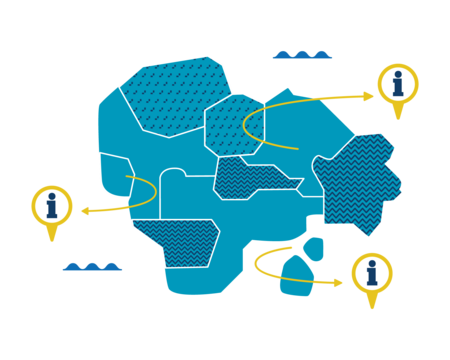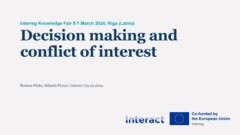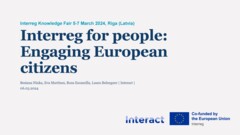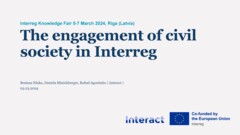Roles and responsibilities
When referring to role and responsibilities in Interreg, it is the many ways in which programme bodies are configured, empowered and deployed. No single approach is used, as countries and regions find their own solutions to configure programmes. The programmes management and control system define these roles and the interfaces between them, which are therefore largely fixed for the period.
Interact events offers moments to exchange on the tasks being fulfilled, and the perspectives of those undertaking them. This means enabling the sharing of experiences from those acting as a Managing Authority, as a Joint Secretariat, as a Monitoring Committee member, as a Controller, as an Audit Authority, or as a National Authority to better understand each other and develop smoother workflows.
Interact also explores the roles of National Contact Points, which more programmes are adopting as ways to connect Interreg's offer of EU funding with local and regional governments.
Where to start
The basic structure of a programme in 2021-2027 is set out in this diagram. It provides a general picture of the structures and positions of programme relevant bodies.
The roles and responsibilities, particularly in the project selection phase is explored in this publication.
Some examples of the approach to the management and control systems were discussed in an event, and are available to review.
The role of national contact points was explored in a report, which provides a useful overview of the ways programmes approached NCPs .
What we are working on
The exchange of perspectives between programme bodies is central to many Interact events, and the roles and responsibilities of programme bodies and staff are continually explored. In 2026, following the work initiated during the last IKF edition, we will continue exploring the roles and responsibilities of different programme parties, including the application of the partnership principle and the PBA approach. These discussions will be carried out through events and workshops dedicated to the post-2028–2034 programming period, with a focus on both programming and implementation.
The certified course Interreg Programme Introduction, will be published soon. This certified course is designed to provide participants with a clear overview of how Interreg programmes function. It will allow for a comprehensive overview of the overall structure of programmes, and the roles and responsibilities of the different stakeholders involved. Further details will be available on the Academy site.
In September, the National Contact Point (NCP) network meeting will offer expertise in programme management, finance, and communication. This event will feature tailored sessions designed to strengthen collaboration and build the skills of NCPs and programme bodies.
In addition, the "MC introduction guide" outlining the roles and responsibilities of Monitoring Committee members in Interreg programmes is being published. It provides new and experienced members with an overview of their role in programme governance, based on regulatory requirements, while highlighting that each programme has specific ways of working to be familiarised with.
Contact
For more information please contact Besiana Ninka.
Want to exchange on this topic?
Interact offers an online space for National Contact Points. to share information and exchange. You can find out more about our MS Teams environment on our Networks page, and see all our networks in our Portal.
If you would like to learn more about this, please contact Besiana Ninka.
Recent Events
Regional network meeting of programmes in Central and South-East Europe

01-02 October 25 | Lecce, Italy








